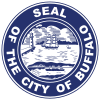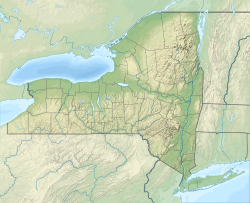
Buffalo, New York
City in New York State / From Wikipedia, the free encyclopedia
Dear Wikiwand AI, let's keep it short by simply answering these key questions:
Can you list the top facts and stats about Buffalo, New York?
Summarize this article for a 10 year old
Buffalo is a city in the U.S. state of New York and the county seat of Erie County. It lies in Western New York at the eastern end of Lake Erie, at the head of the Niagara River on the Canada–United States border. With a population of 278,349 according to the 2020 census, Buffalo is the second-most populous city in New York state and the 81st-most populous city in the U.S.[10] Buffalo and the city of Niagara Falls together make up the two-county Buffalo–Niagara Falls metropolitan area, which had an estimated population of 1.2 million in 2020, making it the 49th-largest metro area in the U.S.
Buffalo | |
|---|---|
| Etymology: Named after the nearby Buffalo Creek, which was named by French and Moravian explorers[1][2][3] | |
| Nicknames: Queen City, City of Good Neighbors, City of No Illusions, Nickel City, Queen City of the Lakes, City of Light, The Electric City, City of Trees[4] | |
 Interactive map of Buffalo | |
| Coordinates: 42°53′11″N 78°52′41″W | |
| Country | |
| State | |
| Region | Western New York |
| Metro | Buffalo–Niagara Falls |
| County | Erie |
| First settled (village) | 1789; 235 years ago (1789) |
| Founded | 1801; 223 years ago (1801) |
| Incorporated (city) | 1832; 192 years ago (1832) |
| Named for | Buffalo River |
| Government | |
| • Type | Strong mayor-council |
| • Body | Buffalo Common Council |
| • Mayor | Byron Brown (D) |
| • Deputy Mayor | Rashied McDuffie (D), Callie Johnson (D) |
| • State Senators | Vacant & Sean Ryan (D) |
| • Assemblymembers | William Conrad (D), Crystal Peoples-Stokes (D), Patrick Burke (D), Monica P. Wallace (D), & Jon Rivera (D) |
| • U.S. Rep. | Tim Kennedy (D) |
| Area | |
| • City | 52.48 sq mi (135.92 km2) |
| • Land | 40.38 sq mi (104.58 km2) |
| • Water | 12.10 sq mi (31.34 km2) |
| Elevation | 600 ft (200 m) |
| Population (2020) | |
| • City | 278,349 |
| • Rank | US: 81st NY: 2nd |
| • Density | 6,893.41/sq mi (2,661.58/km2) |
| • Urban | 948,864 (US: 50th) |
| • Urban density | 2,786.7/sq mi (1,075.9/km2) |
| • Metro | 1,125,637 (US: 49th)[8] |
| • CSA | 1,201,500 (US: 48th) |
| Demonyms | Buffalonian |
| GDP | |
| • Buffalo–Niagara Falls (MSA) | $84.673 billion (2022) |
| Time zone | UTC−05:00 (EST) |
| • Summer (DST) | UTC−04:00 (EDT) |
| ZIP code | 142XX |
| Area code(s) | 716, 624 |
| FIPS code | 36-11000 |
| GNIS feature ID | 0973345[6] |
| Website | www |
Before the 17th century, the region was inhabited by nomadic Paleo-Indians who were succeeded by the Neutral, Erie, and Iroquois nations. In the early 17th century, the French began to explore the region. In the 18th century, Iroquois land surrounding Buffalo Creek was ceded through the Holland Land Purchase, and a small village was established at its headwaters. In 1825, after its harbor was improved, Buffalo was selected as the terminus of the Erie Canal, which led to its incorporation in 1832. The canal stimulated its growth as the primary inland port between the Great Lakes and the Atlantic Ocean. Transshipment made Buffalo the world's largest grain port of that era. After the coming of railroads greatly reduced the canal's importance, the city became the second-largest railway hub (after Chicago). During the mid-19th century, Buffalo transitioned to manufacturing, which came to be dominated by steel production. Later, deindustrialization and the opening of the St. Lawrence Seaway saw the city's economy decline and diversify. It developed its service industries, such as health care, retail, tourism, logistics, and education, while retaining some manufacturing. In 2019, the gross domestic product of the Buffalo–Niagara Falls MSA was $53 billion (~$62.3 billion in 2023).
The city's cultural landmarks include the oldest urban parks system in the United States, the Buffalo AKG Art Museum, the Buffalo History Museum, the Buffalo Philharmonic Orchestra, Shea's Performing Arts Center, the Buffalo Museum of Science, and several annual festivals. Its educational institutions include the University at Buffalo, Buffalo State University, Canisius University, and D'Youville University. Buffalo is also known for its winter weather, Buffalo wings, and three major-league sports teams: the National Football League's Buffalo Bills, the National Hockey League's Buffalo Sabres and the National Lacrosse League's Buffalo Bandits.











